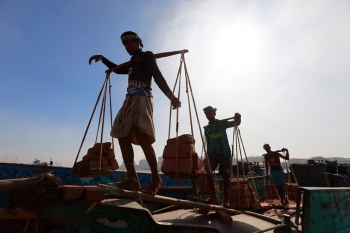
.png) Dr Suresh Mathew
Dr Suresh Mathew

There are two issues India, of late, finds itself in a not so pride of place. They are the modern day slavery and malnutrition. Despite the talk of India becoming a world leader and Prime Minister Narendra Modi’s promise of making the country a $5trillion economy by 2025, the Global Slavery Index 2023 shows that India has the largest number of people facing modern slavery (It is another matter that Modi’s promises remain a far cry as things stand today).
A definition of modern slavery would give a better insight into the issue. It refers to situations of exploitation that a person cannot refuse or leave due to threats, violence, coercion or abuses of power. These include a range of abuses such as sexual exploitation, forced marriage, human trafficking, forced labour and exploitation of children. There are several instances of forced and bonded labour which have been reported from various states in the recent past. As late as last week, a report from Osmanabad district in Maharashtra about police rescuing 11 labourers chained in work places should open the eyes of doubting Thomases in this respect. There are organised rackets involving agents and contractors who are involved in exploiting unemployed labour, children living in troubled families, women from poor background and so on. Laws and regulations to prevent forced labour or trafficking of people are observed more in violation.
On equal measure, the issue of malnutrition too should take centre-stage. Every government makes ‘pulpit speeches’ on the need to tackle the menace. But they either fail to take adequate measures or follow flawed policies. Over 1.7 million children in India have been categorised as “severely acute malnourished”. As many as 67.1 percent under the age of five, and 57 percent women between 15 to 49 years of age are also anaemic. But the government’s move to tackle it by supplying rice fortified with iron, folic acid and vitamin B-12 has not found favour with government’s own policy-decision bodies. Moreover, the pilot projects experimenting with fortified rice has not been completed. Over and above, doubts have been expressed about the foreign company which is expected provide the technological know-how in this regard.
Eradication of modern slavery and the menace of malnutrition is possible if, and only if, the government takes the bull by the horns, without partisan attitudes. In the case of the former, the government has to implement the laws that criminalize all forms of slavery while safeguarding the rights of the victims. Instances like powerful people eluding arrest despite being charged with POCSO cases would only help to give a boost to modern day slavery. The civil society too should lent a helping hand by raising awareness in this regard.
Unfortunately, the country is going through a phase in which targets and promises fail to match the achievements by miles. This happens because of two reasons: one, those making the promises are trying to hoodwink people to camouflage their failures; two, targets are fixed and policies are drawn by people who lack the expertise in the field. Moreover, the government’s achievements have gone off the mark because of its lopsided priorities.